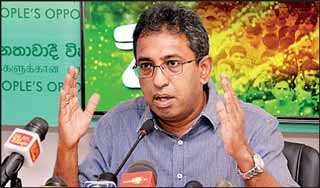Tuesday Feb 24, 2026
Tuesday Feb 24, 2026
Monday, 5 April 2021 00:18 - - {{hitsCtrl.values.hits}}
By Asiri Fernando
 |
| SJB MP Dr. Harsha de Silva - Pic by Lasantha Kumara |
Opposition MP and former regime’s Economic Reforms Minister Dr. Harsha de Silva yesterday called on the Government to be transparent on its loan repayment plan, urging that there is a credible need to
engage investors on a debt restructuring policy.
Addressing the press at the Opposition Leader’s office, the Samagi Jana Balawegaya (SJB) MP raised concerns about what he described as “financial crisis deepening” if the Government didn’t act quickly to restore investor confidence.
Citing reports regarding plans to delay payment of Sri Lanka Development Bonds (SLDBs) and the Central Bank’s quick rejection of the allegations, Dr. de Silva said that the Government will have to urgently communicate how it will service the SLDBs to the international financial markets. Dr. de Silva blamed the Government’s fiscal policy for Sri Lanka’s alleged worsening financial crisis.
“The Government runs the risk of triggering a cross-default if it delays repayment of SLDBs,” the SJB MP warned.
Sri Lanka Development Bonds are issued under Sri Lankan laws and are mostly purchased by local private banks, he explained.
Cautioning that while SLDBs may fall under local jurisdiction, a 2011 International Sovereign Bond of $ 1 billion is due in June this year under New York Law.
The SJB MP claimed that if SLDBs are not honoured on time the Government runs the risk of triggering a cross-default situation, which may compel some international creditors to seek repayment of their loans immediately via intervention by a trustee.
“If the Government delays payment of the SLDBs, a trustee can request Sri Lanka to take corrective action within a month and if such action is not taken in a timely manner, they can call on the Government to repay all of their loans immediately. This may be communicated through the trustee,” Dr. de Silva stated, pointing out that Sri Lanka has to $ 10-11 billion worth of International Sovereign Bonds outstanding.
“We call on the Government to be transparent and come clean to the public about the debt crisis. We urge the Government to be sincere and realistic when addressing this issue. This is not a political crisis that only affects a few people in the Government. It affects all Sri Lankans. We run the risk of being blacklisted from international financial institutes,” claimed Dr. de Silva.
He also pointed out that Special Drawing Rights, which the US Congress may approve for the International Monetary Fund, may find Sri Lanka eligible to obtain $ 600 to 700 million in the near future.
He said such a facility could be used as a stop-gap measure to aid in debt servicing. Dr. de Silva urged the Government to put forward an effective debt restructuring plan and seek a dialogue with the IMF on the matter.
Dr. de Silva opined efforts by the Government to bring Foreign Direct Investments (FDIs) had not yielded the expected results and pointed out that swap agreements aimed at expanding the dwindling foreign reserves haven’t worked either.
Citing a 1 April report by the Central Banks, De Silva pointed out that foreign investors have moved nearly Rs. 372 million investments out from the Colombo stock market during the last few months. “This points to declining investor confidence,” he claimed.
